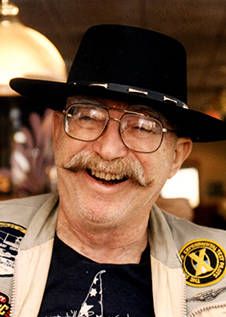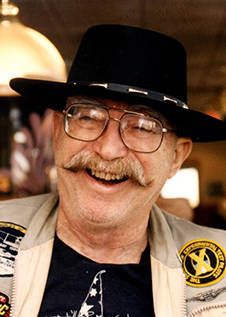---
The Chroniclers
Martin Caidin
Author and Talk Show Host
Like Asimov, Martin Caidin wrote more non-fiction than fiction, his books numbering approximately 160. Unlike Asimov, Caidin was unschooled, self-educated, and a doer who actively participated in the race into space. He was with Wernher von Braun's team in 1955 at Cape Canaveral. An active pilot and aerospace expert, Caidin wrote both historical works and novels as the actual events happened.
Orphaned at an early age and placed in a home, Caidin was taken in by his grandmother on an upstate New York farm, but then set out on his own in his early teens without finishing high school. (Daughter, Pam Caidin, adds, "My dad was not really orphaned. Only his mother died when he was two. When his father remarried, the new wife did not want to raise him, so he was put in an orphanage. It affected his relationships for the rest of his life. I don't know the details of when and who sprung him from the orphanage, but I do know that he ran away when he was 15 and was living on his own in NYC, writing for magazines.")
In New York, Caidin was a loud and tough kid, a street survivor of numerous combats who claimed that half the bones in his body had been broken. He never considered failure as an option. His self education was aided by a photographic memory and his manuscripts were typed first draft. One of Caidin's friends made during this time period was another doer-dreamer, astronomer Carl Sagan.
Flying, in part for its dangers, soon became Caidin's passion and he absorbed everything about it that he could find. And he dearly loved aeronautical history. He saw its heroes as larger than life and worked non-stop to raise them up on pedestals. He went through hundreds of thousands of photographs for the military, creating in 1957, Air Force, a pictorial history of flight and warfare for the USAF, and Golden Wings, another pictorial history for the Navy and Marine Corp in 1960.
Caidin began writing science fiction in 1956 with "The Long Night." He wrote the novel, "Cyborg," that was the basis for the TV program "The Six Million Dollar Man" and its spinoff "The Bionic Woman." Caidin also wrote "Marooned" which became an Oscar-winning film and a recent collaboration with Jay Barbree on the results of the Hubble telescope's first photographs, "1995's A Journey Through Time."
The March 27, 1997, issue of Florida Today used these words in its editorial tribute to Caidin following his death. "An old soul, a young spirit, terminally feisty, forever ambitious…for himself, his people, his nation, his space program."
He immersed himself in his work throughout his career. While researching his acclaimed book "Thunderbirds," he spent five weeks living with and flying with the famous U.S. Air Force jet aerobatic team. "Thunderbirds" has gone through 22 printings. Working with Jiro Horikoshi, designer of the Japanese Zero, and Masatake Okumiya, chief of Japanese Intelligence during World War II, he produced "Zero" and "Samurai."
An avid pilot, Caidin was best known for his Junker JU 52-3M, mostly used for reconnaissance, and a Messerschmidt fighter. He also flew as a stunt pilot on such films as "The War Lover," "The Battle of Britain" and "The Longest Day."
When speaking about his life, Caidin once said "First of all, the world is never hostile - it just plain doesn't give a damn. Secondly, you have only one enemy in the world and you look at him in the mirror every day.
---
Orlando Sentinel obituary link; https://www.orlandosentinel.com/news/os-xpm-1997-03-25-9703240921-story.html
---
Martin Caidin, Space and Aviation Author, 69
by The Associated Press March 28, 1997
Martin Caidin, a prolific writer whose favorite subjects were space and aviation, died on Monday at the Arbor Health Center here. He was 69 and lived in Cocoa Beach, Fla.
The cause was thyroid cancer, according to The Orlando Sentinel.
Mr. Caidin was an experienced pilot and stuntman as well as a broadcaster, lecturer and teacher. One of his novels, ''Cyborg,'' inspired the 1970's television series ''The Six Million Dollar Man,'' starring Lee Majors. Another novel, ''Marooned,'' was the basis for a 1969 film with Gregory Peck.
His other books include ''Black Thursday,'' ''Zero!,'' ''The Long Night,'' ''Overture to Space,'' ''Almost Midnight'' and ''The Last Dogfight.'' He collaborated with Harry Combs on ''Kill Devil Hill: Discovering the Secret of the Wright Brothers'' and wrote screenplays and magazine articles.
He is survived by his wife, Dee Dee, of Tamarac, Fla.; two daughters, Jamie Winkler of New York City and Pam Caidin of Golden, Colo., and three grandchildren.
---
The Chroniclers
Martin Caidin
Author and Talk Show Host
Like Asimov, Martin Caidin wrote more non-fiction than fiction, his books numbering approximately 160. Unlike Asimov, Caidin was unschooled, self-educated, and a doer who actively participated in the race into space. He was with Wernher von Braun's team in 1955 at Cape Canaveral. An active pilot and aerospace expert, Caidin wrote both historical works and novels as the actual events happened.
Orphaned at an early age and placed in a home, Caidin was taken in by his grandmother on an upstate New York farm, but then set out on his own in his early teens without finishing high school. (Daughter, Pam Caidin, adds, "My dad was not really orphaned. Only his mother died when he was two. When his father remarried, the new wife did not want to raise him, so he was put in an orphanage. It affected his relationships for the rest of his life. I don't know the details of when and who sprung him from the orphanage, but I do know that he ran away when he was 15 and was living on his own in NYC, writing for magazines.")
In New York, Caidin was a loud and tough kid, a street survivor of numerous combats who claimed that half the bones in his body had been broken. He never considered failure as an option. His self education was aided by a photographic memory and his manuscripts were typed first draft. One of Caidin's friends made during this time period was another doer-dreamer, astronomer Carl Sagan.
Flying, in part for its dangers, soon became Caidin's passion and he absorbed everything about it that he could find. And he dearly loved aeronautical history. He saw its heroes as larger than life and worked non-stop to raise them up on pedestals. He went through hundreds of thousands of photographs for the military, creating in 1957, Air Force, a pictorial history of flight and warfare for the USAF, and Golden Wings, another pictorial history for the Navy and Marine Corp in 1960.
Caidin began writing science fiction in 1956 with "The Long Night." He wrote the novel, "Cyborg," that was the basis for the TV program "The Six Million Dollar Man" and its spinoff "The Bionic Woman." Caidin also wrote "Marooned" which became an Oscar-winning film and a recent collaboration with Jay Barbree on the results of the Hubble telescope's first photographs, "1995's A Journey Through Time."
The March 27, 1997, issue of Florida Today used these words in its editorial tribute to Caidin following his death. "An old soul, a young spirit, terminally feisty, forever ambitious…for himself, his people, his nation, his space program."
He immersed himself in his work throughout his career. While researching his acclaimed book "Thunderbirds," he spent five weeks living with and flying with the famous U.S. Air Force jet aerobatic team. "Thunderbirds" has gone through 22 printings. Working with Jiro Horikoshi, designer of the Japanese Zero, and Masatake Okumiya, chief of Japanese Intelligence during World War II, he produced "Zero" and "Samurai."
An avid pilot, Caidin was best known for his Junker JU 52-3M, mostly used for reconnaissance, and a Messerschmidt fighter. He also flew as a stunt pilot on such films as "The War Lover," "The Battle of Britain" and "The Longest Day."
When speaking about his life, Caidin once said "First of all, the world is never hostile - it just plain doesn't give a damn. Secondly, you have only one enemy in the world and you look at him in the mirror every day.
---
Orlando Sentinel obituary link; https://www.orlandosentinel.com/news/os-xpm-1997-03-25-9703240921-story.html
---
Martin Caidin, Space and Aviation Author, 69
by The Associated Press March 28, 1997
Martin Caidin, a prolific writer whose favorite subjects were space and aviation, died on Monday at the Arbor Health Center here. He was 69 and lived in Cocoa Beach, Fla.
The cause was thyroid cancer, according to The Orlando Sentinel.
Mr. Caidin was an experienced pilot and stuntman as well as a broadcaster, lecturer and teacher. One of his novels, ''Cyborg,'' inspired the 1970's television series ''The Six Million Dollar Man,'' starring Lee Majors. Another novel, ''Marooned,'' was the basis for a 1969 film with Gregory Peck.
His other books include ''Black Thursday,'' ''Zero!,'' ''The Long Night,'' ''Overture to Space,'' ''Almost Midnight'' and ''The Last Dogfight.'' He collaborated with Harry Combs on ''Kill Devil Hill: Discovering the Secret of the Wright Brothers'' and wrote screenplays and magazine articles.
He is survived by his wife, Dee Dee, of Tamarac, Fla.; two daughters, Jamie Winkler of New York City and Pam Caidin of Golden, Colo., and three grandchildren.
Family Members
Sponsored by Ancestry
Advertisement
Explore more
Sponsored by Ancestry
Advertisement



